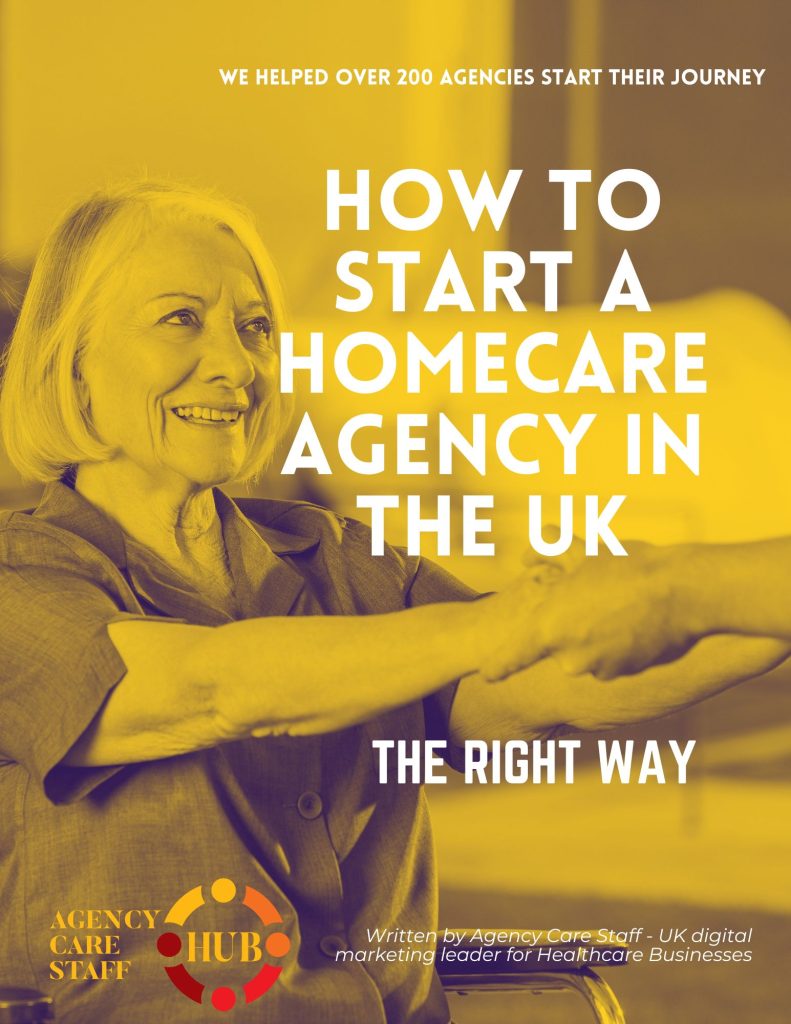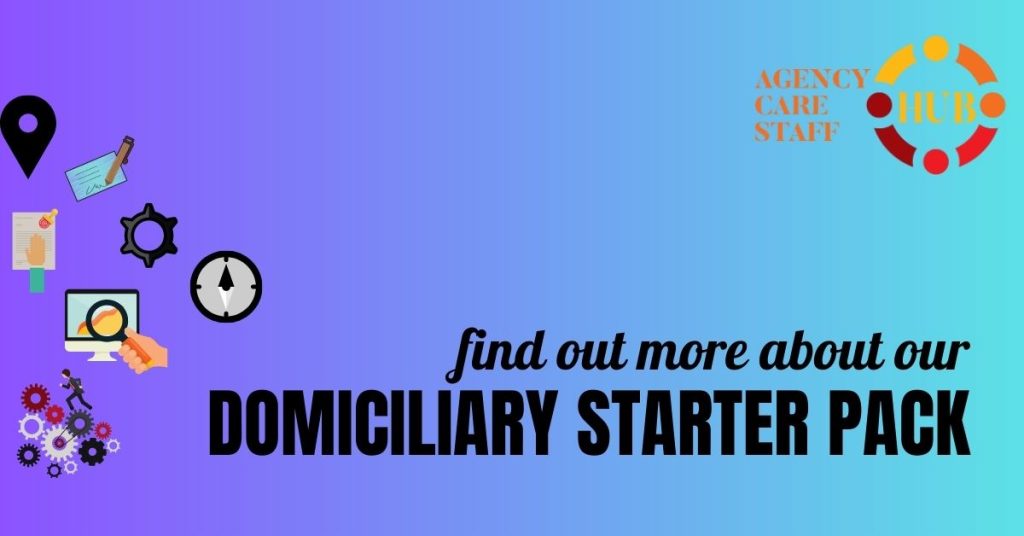How to start a Domiciliary Care Agency in the UK
Hi there. After starting over 50 domiciliary care agencies, and successfully helping people register their business with the CQC, I have learnt a great deal about this type of business. Actually, this is what we do at the moment, day in, day out. In a previous blog, How to start a care agency in the UK we cover some of the basics.
In this comprehensive blog I will go deeper into the topic and try to cascade to you everything I know about starting a Domiciliary Care Agency, in a structured way, and in plain English.
You can also read my 46 pages e-book in which I thoroughly cover step by step how to start a Domiciliary Care company. You can find the e-book here.
First, let me answer 3 of the commonly asked questions, then we will dive into the step-by-step process. There are certain questions that our clients ask us when enquiring about our Domiciliary Business Starter Pack.
What Qualification do I need to be accepted by the CQC (Care Quality Commission)?
As a minimum requirement, CQC will ask for a National Vocational Qualification (NVQ) – Level 5 Diploma in Health and Social Care. CQC will accept your application if you started the course and you are at least half way through it. Hower your chances are diminished. To increase your chances, you need to have completed the NVQ Level 5 course. Doctors, Registered Nurses and Social Workers will have higher chances to be accepted and to pass the interview. Of course, previous experience in managing care businesses makes it a breeze.
How long does the CQC Registration process take?
From creating an account to access the CQC Provider Portal, to receiving the license I would say about 12 weeks. The timeframe varies, based on how many applications processes during that time and on how well you are prepared. Sometimes rectifications are needed, and there will be emails back and forth involved, until CQC is happy with all the evidence that you provided.
Do you support with the CQC Registration?
Yes, we do pretty much everything for you. There are certain things that we can’t complete on your behalf, but we will let you know what are those things are before we start the process.
Now that we answered these important questions, we can start diving into the process.
The first thing you need to do is to find a company that can help you setup the Domiciliary Care Agency. There are only a handful of people or companies in the UK that can provide everything that you need for this type of business. I mean everything. Some are specialised in Policies and Procedures/Documentation, some can help you with the website, logo and design bits, some will help you register with the CQC etc. It is best practice to buy everything from one place. At Agency Care Staff, we can help you with EVERYTHING. If we don’t provide that service, we can recommend our partners. For example, the Liability Insurance. We are not an insurance company, but we can recommend some good insurance companies. To identify a good company that can help, you need to do a thorough research. Check their Google reviews for example. Are they even on Google? Ask to see previous projects they have completed. Once you found the right company then you can start the process.
It is important to do things in order as this will dictate the future of the company. It is extremely hard to remedy errors later, plus it will cost you more money. These are the steps that we are taking when supporting our clients setting up a Domiciliary Care Agency, in chronological order.

Step 1 – Finding a good name
Over the last 30 years people registered tens of thousands of care companies. From my experience, all the good names have been taken. It is a real struggle for new care business to find a good brand name. The name of a new Domiciliary Care Agency must:
- be short (this will dictate how long your website domain name and email address will be)
- be easy to remember
- not contain religious connotations, (you will exclude non-religious clients, basically you are shooting yourself in the foot)
- not leave room for interpretation (sexual, racist, etc)
- have no competition on Google (when you Google the business name, Google should not find any other businesses or websites with similar names; once there are other exact matches or similar companies, they become your direct Google ranking competition)
- not have the website domain name registered
- not to be similar to companies already registered with the Companies House (chances are that their website domain will be similar to yours)
Most of our clients come up with business names or acronyms that have a meaning to them. This means that the name has zero meaning to the client. You might like the name; it might mean something to you but it doesn’t do any good to the business. Please pick a name that favours the business, not you.
We always have a list of 10-20 curated business names ready to share with clients.
At this point, you found a good name. The next logical things are:
- register the business
- buy the website domain name and a hosting plan, consulting with an expert; please, I beg you, do not take this decision on your own; make sure the advice you are getting comes from people that have dealt with this many times, otherwise your business will suffer terrible consequences; even your professional emails are tied to this aspect
Your brand name is now secured.
Step 2 – Logo design
Why is the logo so important? Your logo will dictate how your business will be perceived on the market by everybody that will come in contact with your brand. These can be potential clients, potential staff, your competition, other business partners etc. A rookie logo will put off automatically 50% of these people.
Another reason why your logo is so important is because it will dictate the colours of your brand. Your website, flyers, social media posts, all your documents will follow your brand colours.
Step 3 – Website design
No need to say (I hope), don’t do it yourself unless you are an expert. If you use these website builders advertised everywhere, you will fail from a good website point of view. They are easy to use but you are limited in so many aspects. It is not what you need. I can’t explain in a paragraph what I have learnt in 5-6 years. The person that builds your website must be a WordPress expert and preferably know how the Domiciliary Care businesses work. I have seen websites with text that is not even relevant to the business and my client paid good money for it. Ask if your website will be connected to Google services such as Google Analytics and Google Search Console. Ask how many words your website text will have and if the person that build the website does keyword research. Same as your logo, if your website doesn’t look appealing and modern, it will deter your clients and potential staff members. Nobody wants to collaborate with rookies. You might know what you are doing but your website tells people something else.

Step 4 – Google Business Profile
This is where the company that helps you setting up your business adds you on Google Maps. As Google can be a good source of clients, you want to have a profile that is perfectly setup and tweaked to maximise your ranking between other local similar businesses. Part of the process, Google will try to verify you are a genuine business by either sending a letter with a code to the address, sending an email to your professional email address or asking you to make a video in front of your business address. Same. Leave this to the experts. This will be your office address.
Step 4 – Documents
To start with, let’s discuss systems. Should you buy expensive systems that offer you all your documents? Sure, if you have a lot of money to spend, go for it. You have to know that those systems need a lot of input in order for your documents to be usable. You receive a blank canvas where you have to populate different areas with information. Our advice is to start with the classic format (Microsoft Word documents). They are cheaper and they definitely do the job. Once your business starts to make money, you can invest in software.
Make sure the company that sources you the policies offers you monthly updates. You have to know that in best cases your Policies and Procedures will come 95% ready to use. There always be some dots that you have to fill in simply because the company that creates your policies don’t have access to all the information. Sometimes the information in your company might change. For example, the person responsible with the Infection Control. The company that creates your policies will leva a blank space or add dots for you to fill in this information.
Our division of Policies and Procedures developed an online platform where all your policies are branded and up to date. There is nothing you need to add to them as they ready to use out of the box. To gain access to the policies for domiciliary care please access this website: e-Care HUB.
Ask for a list of documents that you will get for the price.
The pack needs to include:
- HR documents to manage your staff from onboarding to exit
- Care documents, from risk assessments, to daily notes, care plan templates etc
- Financial documents, invoice template etc
- Contract templates
In general, you should get about 450 documents. If it is a lot less than that, you should ask yourself why.
Step 5 – Payroll system
Like any other business that has to pay its employees, you will need a payroll system. You can have this done in-house by you or your office administrator. Or you can outsource this to a payroll company. Either way, choose something simple and cheap, something that does the job. Speak to your accountant.
Step 6 – Staff training
As a Domiciliary Care Agency, you need to evidence to CQC that your staff are well prepared for the task. This means that they are equipped with the right skills in order to deliver appropriate care. Without a good training plan, the CQC inspection outcome will not be a positive one.
Here we recommend a hybrid model, a mix of online and face to face training. 90% of the courses can be done online. Moving and handling, First Aid, Catheter Care and other specialist training has to be done face to face. You must keep records for all your staff training, certificates, attendance, and training expiry dates. You can use Excel to create a so called “Training matrix” which CQC will want to see. ACSTRA Training can offer you CPD Accredited online courses at affordable business rates. You will only have to source the face-to-face course with another company.

Step 7 – Contracts and tenders
I am sure that before you embarked on this journey you have done some research on how to obtain contracts, whether it is via your local council, NHS, or private clients. Wining contracts offered by your local authorities is a different set of skill that you need to master. But don’t worry if you are not good with writing tenders. We have partnered up with the best tender writes in the UK and we can help obtaining contracts on your behalf. Finding private clients however is pure marketing. You need to be familiar with today’s best marketing practices.
Step 8 – Social media accounts
They are part of your brand and complement your website. Websites that have active social media accounts link to them seem to perform better from an SEO point of view. This means that well managed social media accounts can boost your Google ranking.
Step 9 – Recruitment
Startup companies usually hire friends or family members first. Once you have exhausted this list you need to look into websites where you can recruit staff. These websites are also called Job Board Websites. Some examples are: Indeed, Total Jobs, and CV Library. If you are looking to recruit staff fast, these are your best bets. Social media or other methods can be slow.
Step 10 – Communication systems
Please bear in mind that your professional emails should be created by the person that designs your website. Emails come part of your hosting package. Some hosting companies offer unlimited free email accounts, and of them is Bluehost. We use Bluehost to host the websites for over 50 clients and they all benefit of free unlimited emails. We recommend that you use Outlook to manage your emails. It is very stable and it comes part of Microsoft 365. Microsoft 365 is something that you will definitely need as everybody uses Word, Excel, Power Point, Teams and PDF documents.
Part of your communication systems is your phone. We recommend Virtual Landlines due to the low cost and super high level of customisation. You can have welcoming messages, different departments, menus (press 1 for bookings etc), out of hours message, call recording, no need to have an actual handset as virtual landlines can be connected to mobile phones.

Step 11 – Insurance
Usually, Domiciliary Care Providers have the following type of insurance covers:
- Public Liability
- Professional Liability
- Management liability
CQC will need to see a quote during the registration process. This will show that you are committed and prepared to do this type of business.
Step 12 – Fees
Make cold calls and ask your competition how much they would charge for their services. You will have to invent a good profile of an elderly person because they will ask you lots of questions about the “service user”. Study the market really well. A very important role will have your business plan here. The business plan is another document that CQC will need in order to grant you the license.
Step 13 – Register with the CQC
As I mentioned, the person that will have the “Registered Manager” status has to be a doctor, nurse, social worker or have an NVQ Level 5 Diploma. This is a hugely important step and require a lot of preparation. Some new Domiciliary Care Agencies are prepared to go through the registration as the manager has done it before, but the majority hire an expert to guide them. You can use our full support or if you want to apply you can use our guide. Click here to purchase it. If offers you all the information that you need to apply for the CQC Registration and also pass the CQC interview.
This is a link to the CQC Provider Portal where you can create an account to start the application.
Once the CQC license is obtained, you are good to go.
To register with the CQC you will need a secure office. This can be a rented office or a room in your own home. If you choose to start a domiciliary care agency from home then you need to make sure that the office space in your house can be locked. CQC will need reassurance that any confidential data is kept secured. Virtual addresses can’t be used. CQC sometimes will request a video of your office. Clients, families or staff may want to visit your office. Bear this in mind.

Useful links
Online Policies and Procedures – e-Care HUB
Good luck in your journey! 😊
Click on the picture or button below to find out more about Domiciliary Care Agency Starter Pack, services, and prices.





